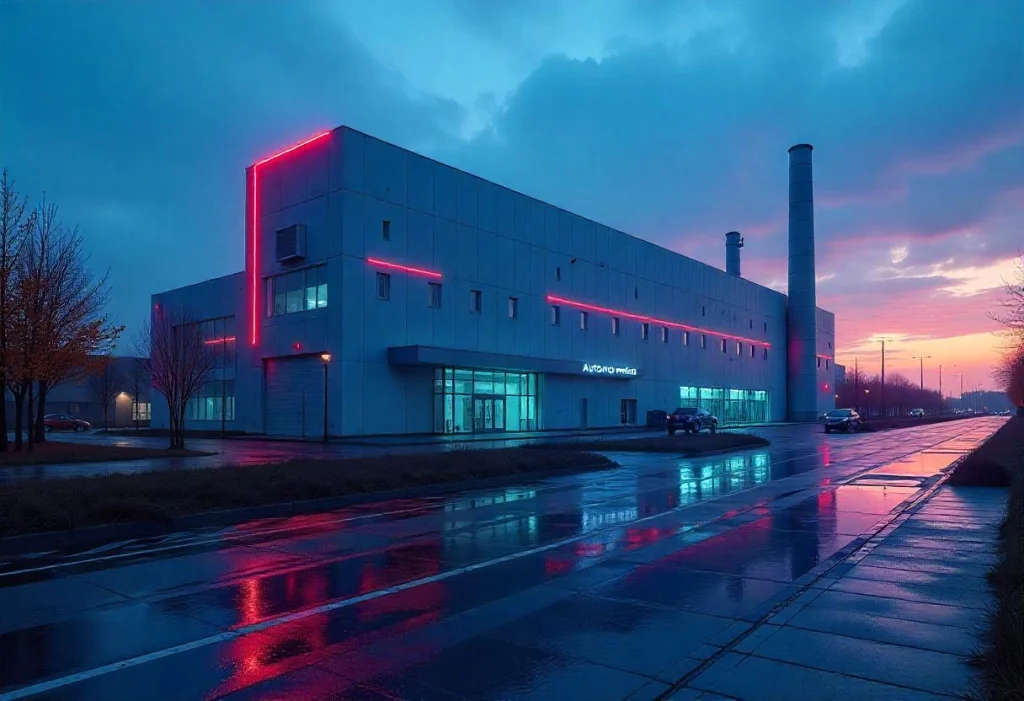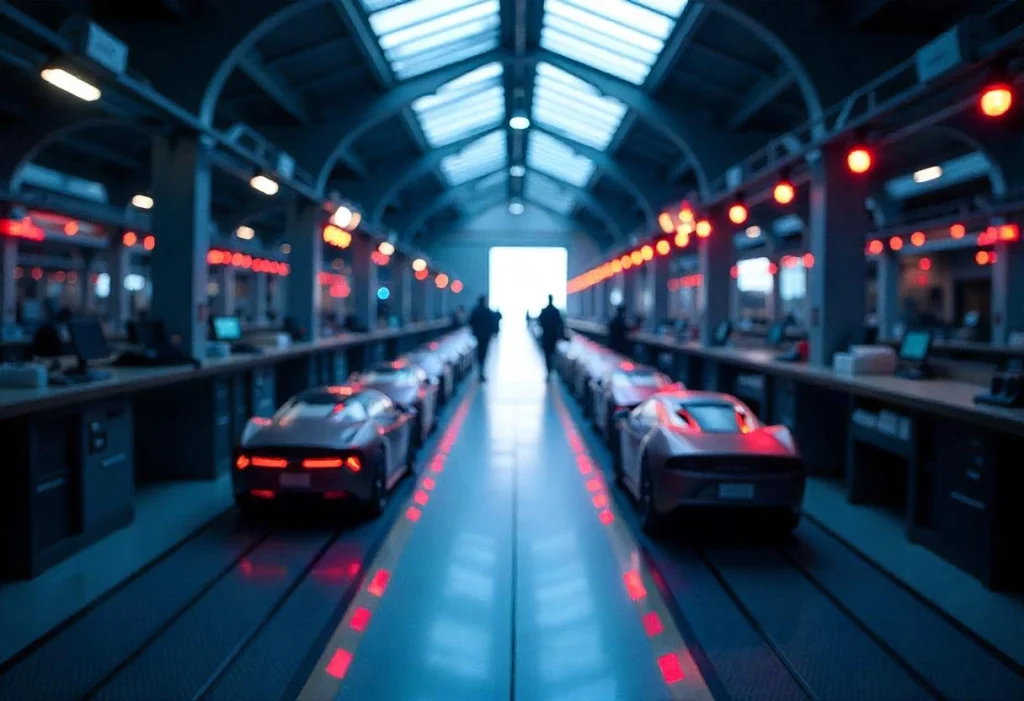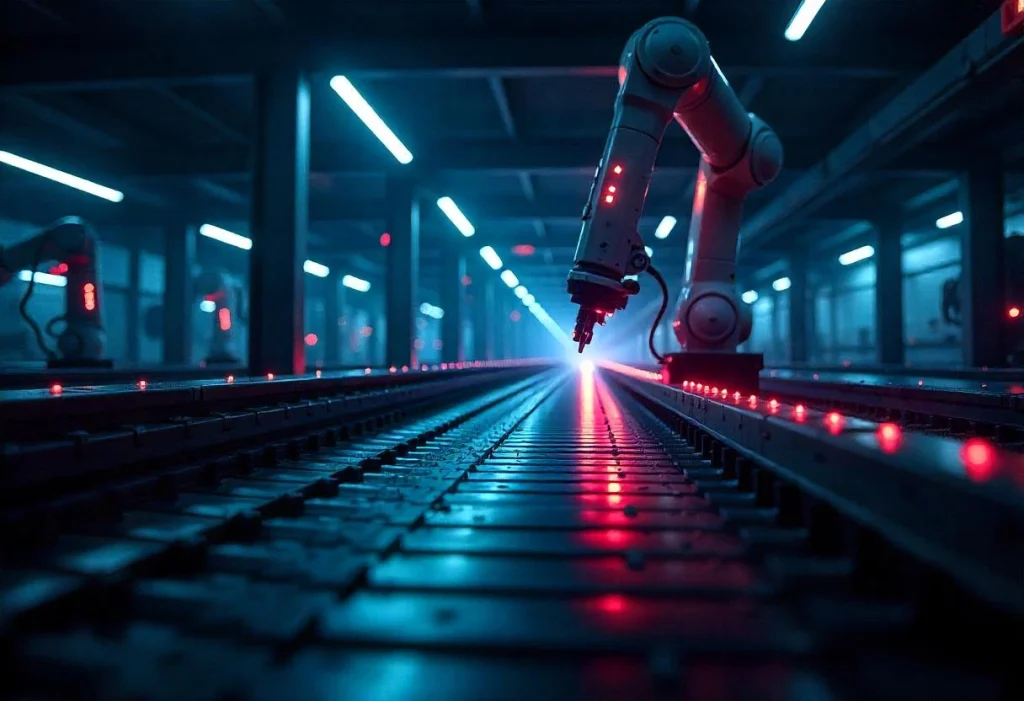
Smart factory – how close are we to its full realization?
It is said that the smart factory of the future will have only two tenants: a dog and a human. The human will be there to feed the dog, and the dog will be there to make sure the human doesn’t touch anything. Although it sounds like a joke, the vision of factories operating almost autonomously is not that far off at all.
How far are we from full, intelligent automation? What technologies make it possible? Which industries can transition to it the fastest? Find the answers to these questions in this article.
What is a smart factory?
A smart factory is a production facility where most processes are automated and managed by autonomous systems.
It uses technologies of Industry 4.0, such as artificial intelligence (AI), Internet of Things (IoT), advanced control systems and robotics. Process automation includes not only manufacturing, but also warehousing, logistics and quality control.
In the most developed forms, we are talking about so-called dark factories (dark factories). These factories can operate completely without human presence.
New technologies used in autonomous factories
Smart factories are based on modern technologies. They allow them to operate efficiently and without constant human intervention.
Automation, data analysis and intelligent management systems make production smoother and more precise. What solutions allow this organization of work?
- Industrial robots and automation systems – Robots perform assembly, welding, painting, quality control and packaging operations. Thanks to AI algorithms, they can independently adapt their actions to changing conditions.
- Internet of Things (IoT) – smart sensors collect data from machines and equipment, allowing for ongoing analysis and optimization of operations.
- MES (Manufacturing Execution System) – are responsible for monitoring production processes and real-time management. They make automation effective and eliminate losses.
- ERP systems – integrate production, financial and logistics management, providing full operational support for factories.
- Artificial intelligence and machine learning – allow analysis of huge amounts of data and optimization of production processes. AI can predict failures, adjust production parameters and increase the efficiency of raw material consumption.
- Autonomous AGVs and AMRs – transport materials and products between stations without the need for human intervention, further increasing efficiency.
- Advanced quality control systems – such as vision inspection systems eliminate defective products and ensure the highest level of precision.
- Digital twins (digital twins) – enable virtual mapping of production processes, allowing them to be optimized without physical intervention.
- Blockchain in manufacturing – provides transparency of supply chain and security of data exchange in a smart factory.
Technologies used in autonomous factories allow for smooth and efficient production organization. Through systems integration, analytics and automation, processes can be constantly monitored and improved.
This approach enables better utilization of resources and minimization of downtime, which translates into greater stability of operations.
How is the smart factory implementation going?
Transforming a manufacturing plant into a smart factory is a process that requires good organization and gradual implementation of new technologies.
It is not enough to install the systems – it is important to adapt them to specific production and integrate them with the already existing infrastructure.
So what does such a step-by-step process look like?
- Analysis of current processes – determining the level of automation and identifying areas for optimization;
- IT and IoT integration – connecting devices and machines into one cohesive system;
- Implement MES and ERP systems – to ensure smooth data flow and effective process management;
- Automation – gradual implementation of robotization and intelligent manufacturing systems;
- Testing and optimization – checking the performance of new solutions and adapting them to the specifics of the plant;
- Staff training – A smart factory requires a new approach to management, so employees should be trained to handle new technologies;
- Continuous monitoring and development – technology is changing, so it makes sense to keep your smart factory up to date with new developments.
Deployment should not be a one-time project, but a continuous process of adapting technology to changing conditions.
The combination of automation, data analysis and systems integration allows for more predictable and efficient production management. It is also worth remembering to properly prepare the team that will be working with the new solutions on a daily basis.
Get 5 chapters of the book for free!
Join the newsletter and gain access to 40% of the book
“15 Steps to Buying an Information System“.
The future of smart factories
Smart factory automation is a process whose tenets are constantly evolving. We can expect smart factories to become standard in many industries within the next decade.
The development of autonomous manufacturing plants is not only a matter of technology, but also regulations and economic aspects related to implementation costs.
Factories that already invest in process automation can expect long-term benefits. Among them are reduced operating costs, improved energy efficiency and increased production flexibility.
Does implementing a smart factory pay off?
Full automation of a manufacturing plant involves an investment, but also allows to obtain a number of benefits. Changes affect not only operating costs, but also the quality, efficiency and stability of manufacturing processes.
In addition, examples of the advantages of implementing such a solution are:
- Save labor costs – wherelabor costs are high, automation allows them to be significantly reduced;
- Improved product quality – machines eliminate human error, ensuring high repeatability;
- Optimizing raw material and energy consumption – with AI and IoT, resource consumption can be fine-tuned;
- Minimizing the risk of failure – Intelligent systems monitor the condition of machines and anticipate potential problems;
- Increase competitiveness – factories that implement intelligent manufacturing systems can respond faster to market changes and introduce new products;
Implementation barriers
Although the smart factory concept offers tremendous benefits, many plants still choose not to implement it.
Here are selected barriers that inhibit implementation of a smart factory:
- High initial costs – One of the biggest challenges can be the high cost of investments in robotization and process automation. The purchase of robots, control systems, IT infrastructure and their integration is an expense that mainly large companies can afford. Smaller plants often lack adequate budgets for such advanced technologies;
- Long paybackperiod(ROI) – although smart factory automation enables to reduce labor costs and increase productivity, the payback period can be several to several years. For countries where the cost of labor is still relatively low, many companies do not see enough savings to justify such a large investment;
- Lack of specialists and technological competence – implementation of a smart factory requires expertise in both automation and data management. Unfortunately, the labor market still lacks engineers and IT specialists who can effectively integrate MES, ERP and advanced AI algorithms. Factories that would like to make the transformation often face difficulties in recruiting the right experts.
- Integrating new technologies with old systems – Many manufacturing plants operate on outdated IT systems and older machinery that are not compatible with modern solutions Industry 4.0. Modernizing infrastructure requires not only large investments, but also time and a gradual transformation, which can cause production downtime.
- Legal and regulatory constraints – implementation of smart manufacturing systems often involves meeting stringent security standards and compliance with data protection regulations. Factories, especially those operating in markets with high regulatory requirements (e.g., automotive, pharmaceuticals), may face numerous regulatory barriers that slow down the implementation of modern technologies.
- Resistance to change and lack of transformation strategy – any change in an organization requires the right approach and preparation of the team. Many companies fear that automating processes and implementing a smart factory will involve major organizational changes that may be met with resistance from employees and managers. In organizations that do not have a clear digital transformation strategy, the implementation process often ends at the pilot stage and does not move to industrial scale.
Although smart factories are the future of industry, their implementation is not easy. High investment costs, a shortage of specialists, complex system integration and regulatory barriers mean that many companies are still putting off the decision to automate.
However, the development of technology, falling prices of solutions and increasing competition in the market mean that more and more companies are beginning to see the real benefits of implementing smart factory.
Smart factories are not only a way to reduce costs, but also to improve production efficiency and flexibility. Industry 4.0 is no longer a distant vision – it is a process that is happening right before our eyes.
Automation, advanced data management and integration of smart manufacturing systems allow companies to better compete and adapt to market volatility. Although implementing a smart factory takes time and investment, it is a step that more and more plants are choosing to take.
Digitalizuj.pl podcast!
If you’re interested in process automation, the development of modern manufacturing and the real challenges of implementing a smart factory, be sure to check out the latest episode of Digitalizuj.pl!
In it, you’ll find more about autonomous factories, the benefits of their implementation, barriers and predictions for the future.
Are you looking for a technology consultant for Industry 4.0?
Feel free to contact me!







